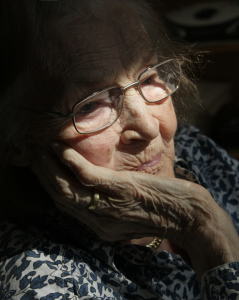
This is fiction but the emotions that arise and pass with loved ones living with dementia are real.
She didn’t usually leave mad. She left sad sometimes. After all, she watched the residents decline from day to day at Sunnybrook Dementia Care Community, the assisted care facility where her mother lived. Alzheimer’s takes its toll, minds and bodies too. Often Sara left scared. She’d ask herself, “Will I be in a wheelchair when I’m 87 like mom? Will I also be unable to find words? To think?”
When Sara walked in today, as she did every day for breakfast, her mother flashed what Sara had come to call “the look.” Her mom’s squinty eyes and frown were code for, “You’re never here. Why don’t you ever come? Where have you been? It’s been months since I’ve seen you.”
Her mother droned on, “They came to get me. They kept saying ‘Allie, Allie’…” then her voice trailed off. No one knew what she meant, not the nurses, nor Sara, nor her mom who had always been called Allie.
Then her mother pointed to Sara and said to a care giver, “this is my mother. She’s the mother.”
While Sara inwardly noted that her mother made little sense, a hospice worker approached and said, “Look at you today, Allie, all dressed up. What a beautiful necklace.” Her mother didn’t know she was wearing her favorite seashell choker, but smiled at the kindness. Then she pointed to Sara and misidentified her again, “this is my sister.”
Sara saw a familiar resident, Tammy, a hugger, and they embraced. Her mom flinched, shook her head, and yelled “NO!”
This “no” was about earrings. Tammy never wore them. And earrings mattered to Allie. Her twitchy fingers unable to guide the post through the tiny hole in her withered earlobe, Allie demanded them as the CNAs dressed her. If they skipped that step, she rang her call bell. If no one answered, Allie pulled at her ears, shuffled around her room and rifled through her costume jewelry until she found two, not always a pair.
As Sara hugged Tammy, her mom screamed, “DON’T! She’s a jerk.” Sara knew better than to argue since her mother had long ago lost the ability to change her mind, and now had no mental flexibility. But in that moment, Sara forgot all she knew about how to be generous and encouraging. She stared and stated, “I’m… being …friendly.”
Her mother shouted, “DON’T DO THAT!” Though she knew better, Sara then made another how-to-care-for-a-relative-with-dementia mistake: she defended herself. “Tammy’s my friend.”
Combative, her mom rolled her eyes. Sara sensed it was going to be one of those days, one of those visits when she couldn’t do anything right.
Sara remembered what she’d learned in her loved-ones support groups–divert attention. So she led her mother away from Tammy to a table where Willie sat with his Cheerios. Her mom bristled. She liked Willie even less than Tammy. Willie “walks too much, always walking, walking, walking. And he’s tough.”
Allie flashed Sara “the look.” Sara saw by her mother’s stiffening and her throwing the place mat that they could not dine with Wandering Willie.
Sara helped her mother to another spot and they sat alone for overdone eggs, white toast and a plastic cupful of prune juice. Her mom puckered her lips. In a violent moment, she spit out the eggs, and swore, “@!!@@!”
She scratched at Sara’s neck and grabbed at the cable- stitch pullover she had knit for Sara years ago, “I like sweater….want it.”
Sara pulled her own clothing back onto her own body, then distracted her mom again, “How ’bout coffee?”
Her mother made the face.
“It’s time for stretch class. Come along Allie,” perked the cheery exercise teacher. Sara and Allie maneuvered their way to the gym, avoiding Willie, avoiding Tammy. Music started to play; Fleetwood Mac, “‘Cause when the loving starts and the lights go down, and there’s not another living soul around, you woo me until the sun comes up and you say-ay that you love me.”
Sara danced and sang the lyrics which her mom, in her almost-deafness, could not hear. Allie jabbed Sara’s arm, “CALM DOWN.”
Not all days went like this. Allie could be child-like, even funny, or beaming when she’d proudly chirp, “This is Sara, such a sweetie….my daughter.”
Not today. Today Sara enraged her mother, embarrassed her. Tomorrow’s visit might be different. Allie might introduce Sara as her mother’s mother, or her cousin. Allie might kiss Sara. It’s true what they taught in Sara’s support group, “Meet the person as they are when you show up. You never know how they’ll be. They can’t adjust. You must.”
Loving, kind, gentle Sara mostly had patience with her mom. Lots of days they laughed together. But today, she’d received only Allie’s finger-wagging and scolding. Not unusual. Most days Sara could feel Allie’s sadness and fear inside her complex disease. Today Sara felt bruised by this organic brain-wasting, life-sucking illness. Today she left mad.



Wow. Very poignant, Sue.